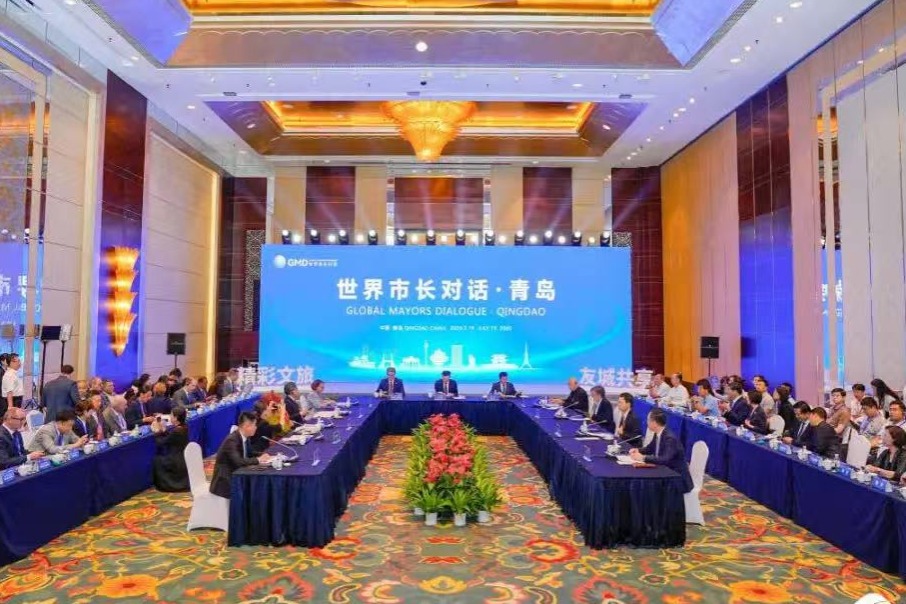Wielding tariffs to impose law of the jungle blindly ignores benefits of mutual respect

The transatlantic partnership, long regarded as the backbone of the global economic order, is at a perilous crossroads. Last week's threat by US President Donald Trump to impose a 50 percent tariff on European goods has drawn pushback from Brussels.
After the US president released a blunt social media post claiming the European Union was exploiting the United States in trade agreements and describing Brussels as "being very difficult to deal with", EU officials and member state representatives responded with a firm line, warning that such coercive tactics could derail critical trade talks and ignite an avoidable economic conflict.
The threat to implement the tariff on June 1 clearly shows the US president is intensifying his tariff tactics in his second term, as highlighted by his threat to hit Apple with a 25 percent tariff on its iPhones unless they are manufactured in the US.
Expounding on the latest tariff proposals, US Treasury Secretary Scott Bessent said in a Fox News interview that the tariffs are not all about trade per se, he said that one of the US' greatest vulnerabilities is external production, especially in semiconductors, "so we would like to have Apple help us make the semiconductor supply chain more secure".
Experts have pointed out, however, that moving iPhone production back to the US is as unrealistic as a fairy tale. As Apple CEO Tim Cook recently said, "People think we're in China for low labor cost. We're not. China stopped being the low-labor cost country many years ago." He said that Apple's supply chain decisions are rooted in the reality that no country in the world offers the same level of manufacturing talent, scalability and coordination as China.
The European response to the tariff threat has been unusually forceful and unified. Valdis Dombrovskis, European Commissioner for Trade and Economic Security, declared that "trade relations must be rooted in mutual respect, not ultimatums", asserting Brussels' willingness to engage constructively but refusing to capitulate to unilateral demands.
Apart from hurting its global trading relations, the adverse impact of the US trade war is also having a negative impact on US consumers who are bearing the brunt of the high costs as retailers have issued warnings that they will not, as Trump has suggested, "eat" the additional costs caused by the import taxes. US retailers such as Walmart, Mattel and Best Buy have announced that they will raise prices because of Trump's tariffs.
Trump's approach reflects a transactional style of diplomacy — one that prioritizes pressure over partnership and short-term posturing over long-term stability. Yet as EU leaders have made clear, this strategy risks far more than stalled negotiations: it threatens the integrity of a relationship that has underpinned global prosperity for decades. The US demands unilateral concessions from the EU to widen market access for American businesses, while Europe seeks a balanced agreement that upholds mutual interests and shared rules.
The planned visit of EU lawmakers to Washington offers an opportunity to reset negotiations. But only if the US recognizes that Europe cannot — and will not — sacrifice regulatory sovereignty or its social-market model to accommodate US companies, nor its trade relations with China at the behest of the US. The EU too will be required to demonstrate pragmatic flexibility, particularly in areas such as the digital trade and critical minerals, where alignment could unlock growth.
But the fundamental difference is the EU's emphasis on "reciprocity" in trade talks underscores its broader strategy of preserving the rules-based international order. By contrast, Washington's zero-sum tactics risk fragmenting the very system that has amplified US influence for decades.
The US president's trade policies have already triggered rounds of significant global market volatility and fueled concerns about a potential recession. It is high time Washington woke up to the truth that unilateralism and tariff coercion will only bring back the "law of the jungle" and make everyone a victim, including itself.
Instead of being a boost for US companies, the "beauty" of tariffs is misleading, as they have entrenched the inefficiencies and diminished the competitiveness of US manufacturers.
In an interconnected global economy, resorting to protectionism is not a way to show strength, but rather a sign of shortsightedness and self-isolation.
Today's Top News
- ?Typhoon Wipha pummels Guangdong province
- Japan's ruling coalition faces tight election test
- 'Pet' major launched as demand surges
- EU's sanctioning of Chinese financial institutions unjustifiable
- China coastal regions brace for Typhoon Wipha
- Premier stresses high-quality implementation of major national projects






























